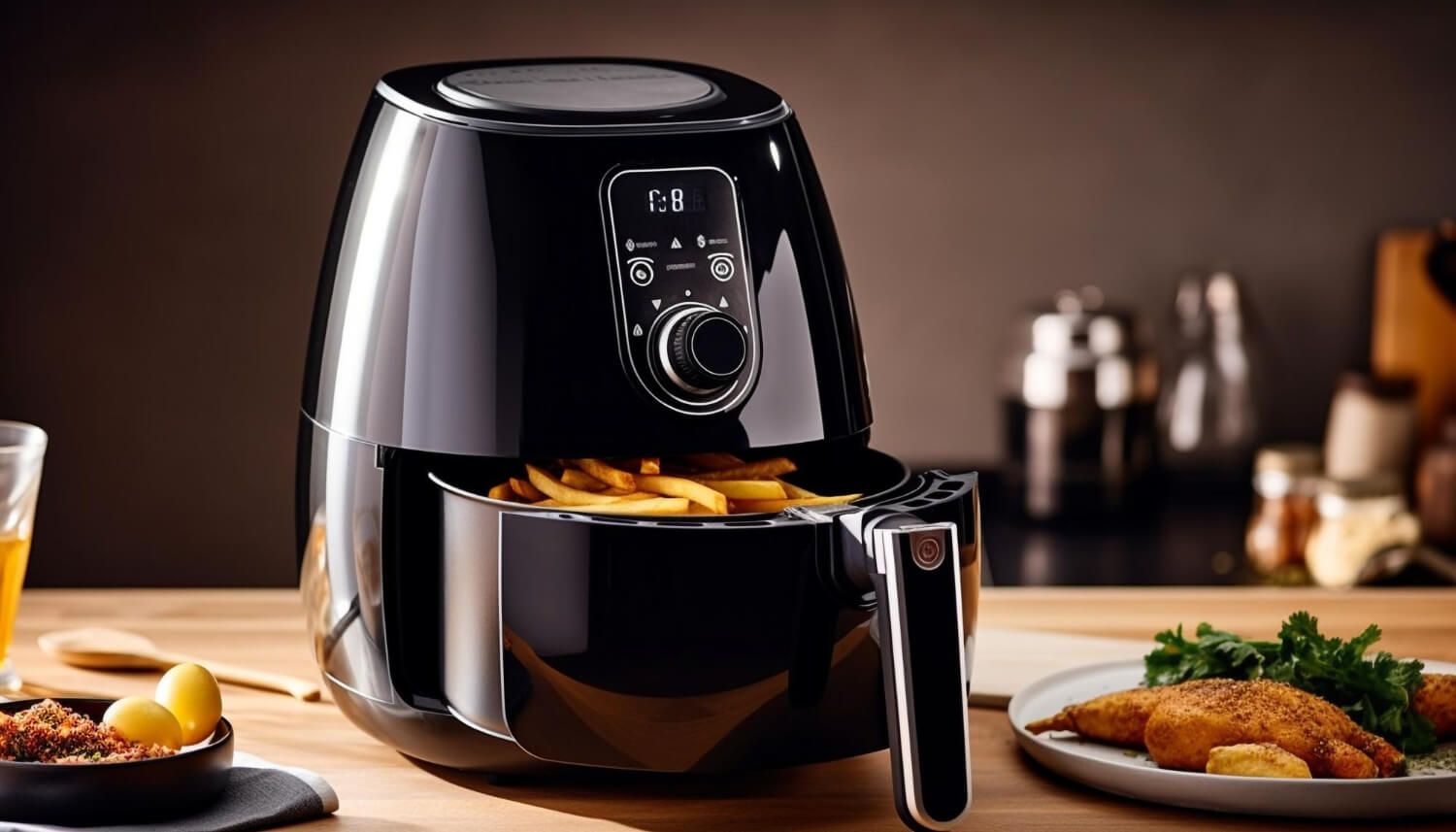Air fryers, the modern kitchen marvel, have become indispensable for many households. Their rise in popularity can be attributed to their promise of delivering healthier meals without compromising taste.
This buyer's guide to air fryers will provide an in-depth look into this innovative cooking technology, its numerous benefits, and essential factors to consider when purchasing.
Table of Contents
- How Does an Air Fryer Work?
- Benefits of Using an Air Fryer
- Factors to Consider When Buying an Air Fryer
- Common Mistakes to Avoid
- Tips for Using an Air Fryer
- Comparing Air Fryers to Other Cooking Appliances
- Different Types of Air Fryers
How Does an Air Fryer Work?
The air fryer's magic lies in its unique design and technology. It's equipped with a heating element and a powerful fan. The heating element warms the air inside the fryer, and the fan circulates this hot air around the food at high speeds. This rapid air circulation method ensures the food is cooked evenly from all sides, giving it a crispy exterior and a juicy interior. The process mimics deep frying but uses 70-80% less oil.
Benefits of Using an Air Fryer
- Healthier Meals: Air fryers use up to 80% less oil than traditional frying methods, leading to dishes with fewer calories and fats.
- Quick Cooking: Air fryers often cook faster than conventional ovens, saving you time in meal preparation.
- Versatility: Beyond frying, these appliances can roast, bake, and grill, making them a multi-functional addition to any kitchen.
- Safety: With no hot oil to splatter, air fryers are generally safer to use, reducing the risk of burns.
- Consistent Results: The rapid air circulation ensures even cooking, producing consistently crispy and well-cooked results.
- Cost-Efficient: Over time, using an air fryer can save money on cooking oil and energy bills.
- Easy Cleanup: Many air fryers have non-stick, removable parts that are dishwasher safe, simplifying the cleaning process.
- Eco-Friendly: With shorter cooking times, air fryers consume less energy compared to traditional ovens, making them a more environmentally friendly option.
Cons of Using an Air Fryer
- Limited Capacity: Many air fryers have a relatively small cooking capacity, which might not be ideal for larger families or when hosting gatherings. Cooking in multiple batches can be time-consuming.
- Taste Difference: While air fryers can mimic the texture of deep-fried foods, some people believe there's a slight difference in taste compared to traditional frying methods.
- Learning Curve: There can be a learning curve associated with using an air fryer, especially for those accustomed to traditional cooking methods. It might take a few tries to get the desired results.
- Energy Consumption: Even though air fryers are more energy-efficient than ovens, they can still consume a significant amount of electricity, especially with frequent use.
- Space Requirement: Air fryers can be bulky, taking up valuable counter space in the kitchen. This can be a concern for those with smaller kitchens.
- Price: High-quality air fryers with advanced features can be on the pricier side. While there are budget options available, they might lack certain features or durability.
- Noise: Some air fryers can be noisy during operation, which might be disruptive, especially in open-concept homes or during quiet hours.
Factors to Consider When Buying an Air Fryer
- Design and Build Quality: The durability of an air fryer largely depends on its construction materials. Common choices include stainless steel and non-stick coatings. Also, consider its design to match your kitchen's aesthetic.
- Brand Reputation: With numerous brands in the market, prioritize those known for quality and reliable customer service.
- Additional Features: Many modern air fryers boast features like Wi-Fi connectivity and preset cooking menus, enhancing the cooking experience.
- Price Range: Air fryers vary in price. Determine your budget and seek models that provide the best bang for your buck.
- User Reviews: Always consult user reviews before purchasing to gauge the product's quality and performance.
- Warranty and Customer Service: A substantial warranty often indicates product quality. Also, prioritize brands known for stellar customer service.
- Ease of Cleaning: Opt for models that simplify cleaning, especially those with removable and dishwasher-friendly components.
- Noise Level: If noise is a concern, especially in open kitchens or during quiet hours, seek out quieter models.
Common Mistakes to Avoid
- Not Using Enough Oil: While air fryers are celebrated for their ability to cook with minimal oil, it's essential not to skimp too much. A light spray can significantly enhance the food's texture, ensuring that crispy finish we all love.
- Using Aerosol Spray Cans: It might be tempting to use commercial aerosol sprays for convenience, but these can damage the non-stick coating of the fryer. Instead, apply a thin layer of oil to your food with oil sprayers or brushes.
- Not Setting the Right Temperature: Every dish has its optimal cooking temperature. Not adhering to recipe guidelines can lead to undercooked or overcooked meals. Always ensure you set the right temperature for the best results.
- Ignoring Food Placement: Overlapping or stacking food items in the air fryer can lead to uneven cooking. It's essential to arrange food in a single layer, ensuring hot air circulates freely around each piece.
- Not Using Accessories: Many air fryers come with accessories like racks or skewers to optimize cooking. Not using these can limit the appliance's versatility and the variety of dishes you can prepare.
- Skipping Preheating: While some recipes might not mention it, preheating the air fryer for a few minutes before cooking can lead to better and consistent results.
- Using Wet Batter Directly: If you're trying to make dishes that require a wet batter, like fried chicken, it's essential to coat the food with breadcrumbs or panko after applying the batter. This ensures a crispy finish, as wet batter alone can become soggy in the air fryer.
- Not Seasoning After Cooking: While it's common to season food before cooking, some seasonings, especially delicate herbs or certain spices, might lose their flavor when exposed to high heat. It's better to season the food after it's cooked for such ingredients.
- Not Checking Food Midway: Different air fryers might vary temperature and cooking efficiency slightly. Always check your food midway to ensure it's not overcooking and to make any necessary adjustments.
- Forgetting to Clean the Appliance Regularly: While it's mentioned in the cleaning section, it's worth reiterating. Neglecting to clean the air fryer after each use can lead to food residue build-up, affecting the appliance's performance and taste.
Tips for Using an Air Fryer
- Dry Foods Before Cooking: If you've washed or marinated your food, make sure to pat it dry before placing it in the air fryer. Excess moisture can affect the crispiness of the final product.
- Use Oil Wisely: While air fryers require less oil, a light mist can improve the texture of some foods. Consider investing in a quality oil sprayer for even distribution.
- Rotate Food for Even Cooking: For certain foods, especially larger items, it's a good idea to rotate or flip them halfway through the cooking process to ensure even browning.
- Avoid Smoke: If you're cooking fatty foods, the excess fat can drip and cause the air fryer to smoke. Placing a piece of bread or a small dish of water at the bottom can help prevent this.
- Keep Distance: Place the air fryer in a location where it has enough space around it. This ensures proper air circulation and prevents overheating.
- Experiment with Recipes: Don't limit yourself to traditional "fried" foods. The air fryer is versatile, so try out various recipes, from roasted vegetables to baked goods.
- Adjust Traditional Oven Recipes: If you're adapting an oven recipe for the air fryer, reduce the cooking temperature by about 25°F (15°C) and check for doneness earlier than the original recipe suggests.
- Use Foil or Parchment Paper for Easy Cleanup: If you're cooking something messy, line the bottom with foil or parchment paper (making sure not to cover the entire surface, as air needs to circulate). This makes cleanup a breeze.
- Don't Overfill: While cooking a large batch at once might be tempting, overfilling the air fryer can lead to uneven cooking. It's better to cook in smaller batches for the best results.
- Stay Nearby: It's a good idea to stay close by, especially when you're still getting used to your air fryer. This allows you to monitor the cooking process and make any necessary adjustments.
- Invest in a Cookbook: Many cookbooks are dedicated to air fryer recipes. Investing in one can inspire and help you get the most out of your appliance.
Comparing Air Fryers to Other Cooking Appliances
- Air Fryer vs. Deep Fryer: The most significant advantage of air fryers is the health benefit. They use up to 80% less oil than deep fryers, leading to lower calorie intake. While deep fryers might edge out in terms of taste for some dishes, air fryers come very close and are a healthier alternative.
- Air Fryer vs. Oven: Air fryers are generally faster than conventional ovens, saving you time. They are also more energy-efficient, leading to reduced electricity bills. However, ovens might offer more space for cooking larger meals.
- Air Fryer vs. Microwave: Both appliances are quick but operate differently. Microwaves use radiation to heat food from the inside out, while air fryers circulate hot air around the food. This means air fryers can achieve a crispy exterior, unlike microwaves.
Different Types of Air Fryers
- Basket Air Fryers: These are the most common type, featuring a removable basket where food is placed. They are compact and perfect for smaller households.
- Oven Front Air Fryers: Resembling a mini oven, these have shelves to place food and are ideal for cooking multiple dishes simultaneously.
- Air Fryer Ovens: A hybrid appliance that combines the features of a conventional oven and an air fryer. They offer a range of cooking options, from frying to baking.
- Rotisserie Air Fryers: These come equipped with a rotisserie function, making them perfect for cooking whole chickens or roasts evenly.
Further Reading
- If you're looking for affordable options, don't miss our article on the Best Air Fryer Under $100 for top picks that won't break the bank.
- For a comprehensive deep dive into air fryers, check out the article 'Everything You Need to Know About Air Fryers' by Good Housekeeping.
- Experience guilt-free dining with our curated selection of Healthy Vegetable Recipes.
- Savor the delightful simplicity with our Easiest Air Fryer Chicken Recipes.
- Kickstart your morning with delectable dishes from our 12 Air Fryer Breakfast Recipes.



